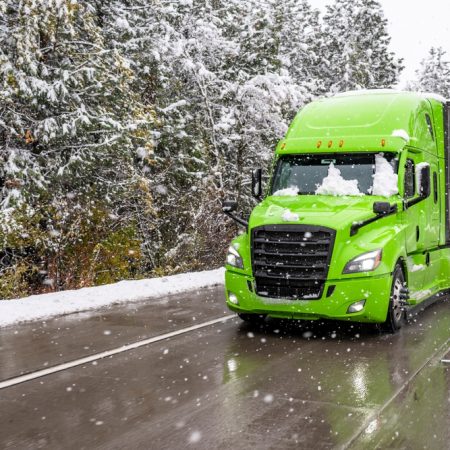

Diesel engines are remarkable in so many ways, but as with everything, they do have their weak spots. One of those is cold weather performance. Diesel fuel includes paraffin in the mixture for a variety of reasons, but when those paraffin wax crystals get cold enough, they solidify and cause fuel to gel. Fuel gelling prevention is a necessity in cold conditions to keep your fuel flowing and your engine running. Shop the AirDog Fuel Heater.
At AirDog®, we are committed to ensuring reliable engine performance in harsh winter conditions. We aim to help AirDog® diesel users get the most out of their engines and we work towards that goal by providing both education and tools—including our diesel fuel heater kit.
Read on to learn about the challenges diesel engines face and valuable winter diesel engine tips to keep your rig on the road no matter how cold it gets.
Let’s look at some of the most common issues our Canada and Northern US diesel customers encounter in winter.
Once the temperature outside reaches freezing, there is a significant risk of fuel gelling in diesel engines. As we mentioned above, the paraffin wax crystals in the fuel will solidify and cause the fuel to gel. You can probably imagine how much trouble this can cause. The fuel needs to be in a liquid state to flow through the fuel system and into the engine. If it gels, it’s not flowing anymore. In fact, once it gels in the filters you have to replace them.
The fuel doesn’t have to become completely solid to cause problems, either. Thickened fuel can cause your engine to stall, to idle roughly, and possibly to not start at all. Even if the engine starts, thickened fuel won’t atomize as necessary to mix with air and combust completely. That causes engine performance issues and increases the emissions you generate, which is bad for your catalytic converter and the environment.
One of the most important cold-weather diesel maintenance steps you can take is to add appropriate fuel treatments to discourage fuel gelling. It’s also a good idea to use winter blend fuels to further protect your engine.
There are a ton of different fuel additives out there for diesel engines. For the purposes of US and Canada diesel maintenance in cold weather, we want to focus on anti-gel additives.
Winter fuel additives focus primarily on lowering the temperature at which paraffin crystals solidify in cold weather. These anti-gel additives help the fuel stay in a liquid state as the temperature drops. They can also include other additives that assist with lubrication, reducing emissions, and improving fuel economy.
It’s a good idea to watch the weather report to stay ahead of significant temperature drops. When the temperature gets to 32 degrees Fahrenheit, you should start adding anti-gelling additives. When it gets to 0 degrees or below you will want to add more. Each product will have specific instructions on how much to add and when, so read the instructions and follow them closely for the best results.
You will find that most fueling stations will offer winter blends as the temperatures get colder, including in winter months and as you get further north. These blends include additives to help prevent gelling along with other additives to help with performance during cold weather.
As always, there will be some suppliers that offer a higher quality product than others. If you have a fuel brand that you know works well for your engine, chances are that the company’s winter blend will be good for your rig as well. Try to avoid going cheap on winter blend fuels because some are better than others.
Winter blend fuels are helpful, but they may not be enough to completely protect your fuel system. It’s best to carry your own additives for cold weather and to add them at the appropriate times even if you are using winter blend fuel.
Additives and winter blend fuels are important, but it can also be helpful to keep a heater on your fuel system to prevent gelling. We offer an optional heater kit that you can install onto the AirDog system to apply heat when the temperature drops below 50 degrees.
The kit includes a 300-watt heater, a 12-volt power supply, and a thermometer that reads the ambient air temperature.
Installation is simple. We remove the water separator, take out a small pipe nipple that’s attached to the base, then replace it with a new one and install the heater. Then we put the water separator back on and you now have a heater between the water separator and the filter base.
The temperature sensor keeps track of how cold it is. Once the temperature gets below 50 degrees, the heater starts applying heat to the system. As the temperature gets colder, the heater ramps up to apply more heat. So it only applies heat when needed and only as much heat as is necessary based on the current conditions.
With the heater installed, you know that the fuel system will always stay warm enough to operate correctly. It provides an extra layer of reliability and protection against gelled fuel.
There are a few things that you can do to protect your AirDog® system in winter conditions, including:
Some of the most important things you can do to protect your system include keeping up with filter changes and monitoring your dashboard indicator light. Ideally, by changing your filters at the correct intervals—usually between 15,000 and 20,000 miles or at least once a year—you can keep ahead of clogs. Keeping your fuel flowing properly works along with fuel additives, winter fuel blends, and our optional heater to protect your system.
If you notice stalling, rough idling, or problems starting your engine, it could be a sign of fuel gelling.
When you are going into cold weather, stay ahead of gelling with proper fuel treatment practices. Choose winter fuel blends and use your favorite anti-gelling additive as the directions indicate to prevent gelling and all the problems that come with it.
Different types of engines work best with different additive mixtures. That’s why it’s a good idea to research your specific engine and look for additives that are right for that engine. You can also talk to other truckers you trust to see what they prefer to use and try it yourself.
If you are doing all of the above and still run into problems with gelling or clogged filters, it’s time to seek professional support. Our AirDog® team is happy to answer your questions at 877-421-3187 or by email. You can also talk to our authorized service centers or your preferred diesel engine mechanic for more assistance.
Winter maintenance for diesel engines is vital to protect your investment and stay operational during cold weather. We encourage you to find the right additives for your engine and use them as instructed. Consider installing our heater kit to provide further protection. As always, we recommend keeping an extra set of AirDog® fuel filters in case you get into a bad situation and need a new filter right away—like if your fuel gels up and you need to change out your filters immediately.
Please contact us with any questions and we will be happy to answer them. We look forward to assisting you!
Low temperatures are no match for AirDog’s advanced filtration and water separation systems. Learn how these filters prevent gelling and performance loss during winter. To prepare your entire operation for seasonal challenges, revisit Preparing Your Fleet for Winter: The Role of High-Performance Fuel Filters.